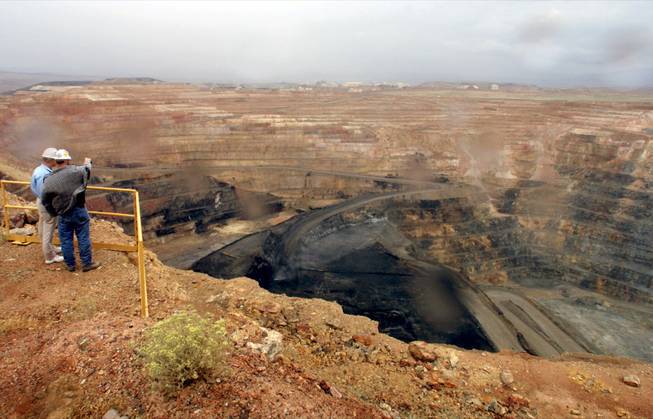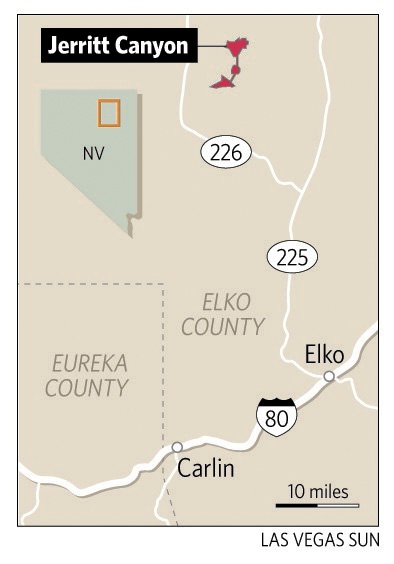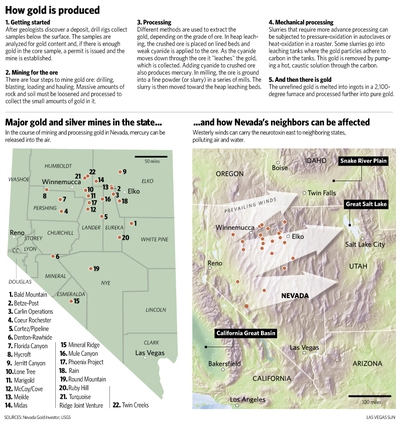
This open pit gold mine is part of a complex operated by Newmont Mining Corp. near Carlin. The EPA alleges that one of the Carlin mines and another in Nevada improperly disposed of mercury, allowing it to leach into the ground from tailings ponds. The company says it sells, not disposes of, most mercury from the site.
Wednesday, June 3, 2009 | 2 a.m.
Sun Archives
- Starting point or model on mercury? (4-21-2009)
- Regulators OK restart of Nevada mine (3-25-09)
- EPA allegations spark call for checks on state's mines (1-27-2009)
- Heavy price for gold (3-5-2006)
- No new laws seen for mines (3-5-2006)
- Nevada mines release most mercury (6-28-2004)
Beyond the Sun
Jerritt Canyon
Enlargeable graphic
A Northern Nevada gold mine that was recently allowed to reopen after being among the region’s worst emitters of airborne mercury had its roasting operations halted recently by state regulators.
The company had failed to install state-mandated mercury reduction equipment on time.
The state’s action came as federal regulators watch Nevada’s new mercury control program and weigh whether to establish a nationwide program for reducing mercury emissions from gold mining.
The temporary shutdown at Jerritt Canyon Mine north of Elko raises questions anew: Is the state’s mercury regulation program sufficient or would a broader federal program better halt toxic emissions from Nevada’s gold mines?
Justin Hayes, program director of the Idaho Conservation League, said the state should have never let the mine reopen until all the new equipment was installed.
Jerritt is operated by Queenstake Resources Inc., a subsidiary of Vancouver-based Yukon-Nevada Gold Corp.
“The decision to allow this company to turn on this roaster without installing this equipment first was clearly a wrong decision,” Hayes said.
In industrial mining, roasting is the process of burning the ore to get at the gold.
Hayes’ group blames Nevada’s gold mines for polluting streams and contaminating fish with high mercury levels, making them unsuitable for eating. Mercury harms brain development, especially in children and fetuses.
Still, Hayes and other environmental groups appreciate the state’s intervention.
“At the very least, the state has shut them down — that’s good,” said John Hadder, director of the Reno-based Great Basin Resource Watch.
The Nevada Environmental Protection Division allowed the mine to reopen in late March contingent on the company’s installing mercury reduction equipment by the end of May.
The state said the company has made great strides in reducing emissions from the site. State inspectors have been there monitoring the work as the company ramped up, said Jill Lufrano, spokeswoman for the Environmental Protection Division.
But the company said a delay in the fabrication of fiberglass duct-work needed for the new system left it unable to meet the deadline, according to a statement on Monday.
The roasters were shut down over the weekend, although other work continues, the company said.
Environmental groups estimate that since the mine reopened in March, several hundred pounds of toxic mercury could have escaped into the air. The state disputes that estimate because the site was not operating at full capacity and other emission reductions have been made, Lufrano said.
Nevada’s regulators believe that once all the mercury emission devices are installed as required, the mine that once spewed four tons of mercury a year will emit no more than 175 pounds.
“Our program is successful,” Lufrano said. “Do we need another program on top of our program? We don’t think so.”
“Things are not fixed overnight,” she added. “But they are certainly fixed a lot faster at the state level than a federal program that might not fit Nevada.”
Following a yearlong investigation, the state in 2008 ordered Jerritt to briefly shut down. The mine reopened a month later, in April, on the condition that it install mercury emissions control equipment by year’s end.
By August, the mine voluntarily shut down without having made the changes. The company reported losing $105 million in 2008 because of the closure.
On March 25, 2009, the state allowed Jerritt to reopen provided emissions equipment was installed before last weekend. When it became clear the company could not meet that deadline, the state ordered the roasting operations to halt. The company expects to have the new equipment installed this month.
As part of a long-running clean air lawsuit, the federal Environmental Protection Agency is expected to announce this summer whether it will draft regulations on mercury emissions from gold mines.
The state has fought the lawsuit, saying a federal program would interfere with the state’s own mercury reductions program, which has been operating for several years. The Nevada Mining Association is also fighting the federal program.



Join the Discussion:
Check this out for a full explanation of our conversion to the LiveFyre commenting system and instructions on how to sign up for an account.
Full comments policy